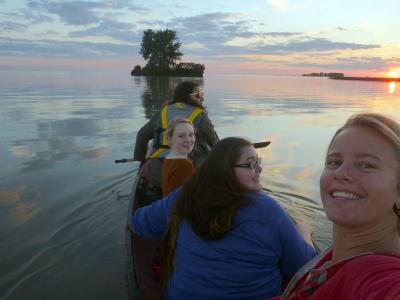** Due to project completion in 2021, the PWIP Research Group will no longer be recruiting students **
Photo courtesy of Courtney Vaughn.
Recruitment and Training
The Planning With Indigenous Peoples (PWIP) Research Group benefits from working with highly motivated graduate students interested in assisting the research group to achieve its project goals and research objectives. Undergraduate students interested in pursuing graduate studies and/or research with the PWIP Research Group should contact Dr. Leela Viswanathan at the Department of Geography and Planning at Queen’s University.
Graduate research assistants working with researchers of the PWIP Research Group come from diverse educational backgrounds and life experiences before seeking their graduate education. Their undergraduate degrees have included:
- Applied Sciences
- Biology
- Geography
- Global Development Studies
- Various programs in the Humanities.
Current Master and PhD research assistants with the PWIP Research Group are pursuing graduate studies in urban and regional planning, environmental studies, geography, and social innovation and resilience studies.
Faculty members assist graduate students to develop research questions and projects that complement those associated with the PWIP Research Group’s current research projects.
In order to broaden student employment options post-graduation, students are encouraged and supported by faculty to make links between their academic research and practical applications in their field of study.
Graduate research assistants working with the PWIP Research Group have been successful in receiving competitive national and provincial scholarships and internal university awards.
Visit the About Us page to learn more about the academic and community researchers involved in PWIP and the Projects page for more information about current PWIP projects, or visit the Contact page to get in touch.
Learn more about the current student research assistants and recent graduates who have gained academic research experience as well as professional planning experience.
Note: Prospective graduate students will need to meet the requirements established by the university graduate program of their interest and should contact their university of interest directly for this information.
Additional Information for Prospective Aboriginal Graduate Students
Prospective Aboriginal graduate students (i.e., First Nation, Metis, and Inuit) with an interest in the current research of the PWIP Research Group are encouraged to contact us and to investigate the additional supports available to them at our respective universities:
- School of Graduate Studies – Aboriginal Students – Queen’s University
- Four Directions Aboriginal Student Centre at Queen’s University
- Aboriginal Education Centre, St. Paul’s University College at the University of Waterloo
Student-to-Student Mentoring
Working within the PWIP research team provides opportunities for students to assist each other in their research. This unique opportunity to learn from other students and to fulfil mentorship roles creates a supportive community that enhances understandings of complex issues and enables theories and ideas to emerge, develop, and flourish.
By facilitating opportunities to engage with and learn from others, the PWIP Research Group enables students to collaborate and strengthen their own research capacities and understandings. Students of various experiences and backgrounds can continually learn from each other. This type of collaboration strengthens the outcomes of individual students’ research and promotes a positive, engaging and supportive learning environment.
In particular, the mentorship aspect is extremely helpful when transitioning into a professional planning work environment as it gives students the experience and confidence to listen, learn and collaborate with others in future team settings. Ultimately, by facilitating student-to-student mentorship, PWIP creates the necessary space for students to grow as scholars and as planning practitioners.
Student Skills Gained with PWIP Research Group
Relationship Building
- Building and maintaining intercultural research relationships and partnerships
- Learning through experience, listening to and collaborating with community research partners and academic supervisors
- Increasing research capacities in a team setting
Critical Theoretical, Analytical and Strategic Thinking
- Gaining extensive policy research abilities
- Exposure to different perspectives and theoretical lenses on complex issues
- Attaining an understanding of regional planning theory, legislation and practice
- Gaining a greater understanding of planning with Indigenous peoples theory, legislation and practice
Qualitative Research Skills
- Gaining experience interviewing research participants
- Attaining competency in community-based participatory research
- Conducting content analysis of data, including interview transcripts and newspaper articles
- Gaining an in-depth understanding of research ethics
Publishing Documents
- Gaining experience writing effectively, drafting and publishing for academic and practitioner audiences
Analyzing Policy and Legislation
- Gaining a strong understanding of complex regulatory policies and legislation that shape everyday planning
- Strengthening the ability to convey the content of complex regulatory policies and legislation to audiences of practitioners and Indigenous peoples
Creating Documents for Planning Practitioners
- Writing, drafting and publishing a range of documents including briefing notes and academic papers for a practitioner audience
Practical Planning Experience
- Gaining effective communication and small group facilitation skills
- Strengthening the necessary skills and understandings to succeed in a range of different planning environments
- Building the ability to work with diverse stakeholders and partners
- Gaining an in depth understanding of regional planning legislation and practice
- Attaining a greater understanding of planning with Indigenous peoples including legislation and practice
- Identifying realistic outcomes and working to tight deadlines
- Managing uncertainty with professional work environments

